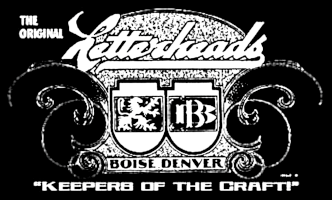I was able to find some red flash glass for my project of restoring the old thread cabinet, & was blessed with the finances to buy it.
Some of you mentioned the tin foil crinkled behind the red flash glass in the drawer windows. Do you have any suggestions on how to go about laying this behind the glass? I have aluminum foil in the kitchen, plus aluminum leaf up here in the shop. The glass may be ready today.
Thank you so much!
Welcome to The Hand Lettering Forum!
This is an interactive Bulletin Board on the topics of Sign making, design, fabrication, History, old Books and of coarse Letterheads, Keepers of the craft. The Hand Lettering Forum features links to resources, sign art history, techniques, and artists profiles. Learn more about Letterheads at https://theletterheads.com. Below you'll see Mchat has been added as a live communication portal for trial, and the Main forum Links are listed below.
This is an interactive Bulletin Board on the topics of Sign making, design, fabrication, History, old Books and of coarse Letterheads, Keepers of the craft. The Hand Lettering Forum features links to resources, sign art history, techniques, and artists profiles. Learn more about Letterheads at https://theletterheads.com. Below you'll see Mchat has been added as a live communication portal for trial, and the Main forum Links are listed below.
Flash Glass & tin foil
Moderators: Ron Percell, Mike Jackson, Danny Baronian
-
Bobbie Rochow
- Posts: 79
- Joined: Mon Jul 25, 2005 6:18 pm
- Location: Jamestown,PA
-
Ron Berlier
- Posts: 245
- Joined: Fri Apr 09, 2004 3:27 am
Bobbie,
To the best of my knowledge the reflective material was set in behind the flash glass during the manufacturing process (presumably there is enough of a gap to NOT flatten the foil out). If you have the drawer front separated this should be easy to do and I assume you do in order to get the glass to stay in place. Otherwise you're going to have a problem getting the glass to stay in place and look as it should.
HTH
To the best of my knowledge the reflective material was set in behind the flash glass during the manufacturing process (presumably there is enough of a gap to NOT flatten the foil out). If you have the drawer front separated this should be easy to do and I assume you do in order to get the glass to stay in place. Otherwise you're going to have a problem getting the glass to stay in place and look as it should.
HTH
Ron Berlier
Wherever I go, there I am.
Wherever I go, there I am.
-
Danny Baronian
- Site Admin
- Posts: 638
- Joined: Wed Apr 07, 2004 2:16 am
- Contact:
Bobbie,
wrinkle up some foil larger than your glass then flatten it some but not so much as to remove the wrinkles. Cut the foil to the size of the glass and cut a backer - matt board or cardboard, and sandwich the three together with the foil in the center, not too tight so the foil remains wrinkled and allows the light to refract off the foil.
Mount this 'sandwich' to the back of the drawer and you should be good to go.
Hope this helps.
Danny
wrinkle up some foil larger than your glass then flatten it some but not so much as to remove the wrinkles. Cut the foil to the size of the glass and cut a backer - matt board or cardboard, and sandwich the three together with the foil in the center, not too tight so the foil remains wrinkled and allows the light to refract off the foil.
Mount this 'sandwich' to the back of the drawer and you should be good to go.
Hope this helps.
Danny
-
Kent Smith
- Posts: 569
- Joined: Fri Dec 31, 2004 6:41 pm
- Location: Estes Park, CO
- Contact:
Wrinkled tin foil, we now use aluminum foil, was adhered to the back of the glass with a thin coat of clear gold size. If needed a thin shim (3 ply card stock) can be added to the corners of the glass to set it off from the wood. I don't know how yours are mounted but the ones I have done had screws through metal corner clips so a shim could be easily put in the corner. In either case, it takes a lot of pressure to flatten the foil to the point that it has no facets left. By the way, a panel can be done on any glass using clear or any color tint goldsize for an interesting faceted background. I demonstrated one of these on my sample piece in Santa Cruz in '84 if anyone remembers along with Gary Volkmann's reverse marble technique and damar embossing.
 Denver Chapter of the Letterheads
Denver Chapter of the Letterheads